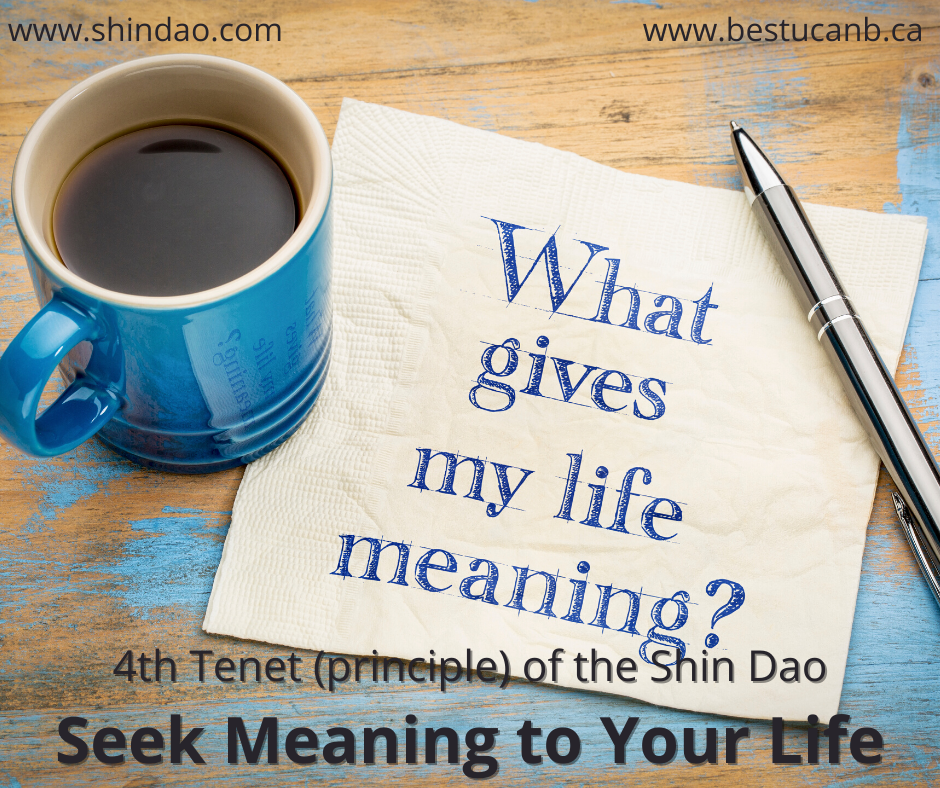The following is an excerpt from our soon-to-be-released book, “The Shin Dao Solution”, co-authored by Tina Thrussell and Neil Thrussell. This excerpt comes from the chapter on the 4th tenet (principle) of the Shin Dao – Seek Meaning to Your Life.
What is the meaning of life? A lot of people would probably consider this a topic of interesting discussion, rather than a scientific issue. Yet, while there are no absolute answers, science does provide some insight that may help you find meaning to your existence.
For thousands of years philosophers have been searching for answers to the meaning of life and our reason for existence. In today’s modern world with fast societal changes, this question becomes even more relevant and takes many different forms, such as “How was the universe created?”, “Why do I live?”, and “What is the purpose of existence?”
The number of different answers to the same question, “What am I here for?” is almost mind-boggling! People might say, “To find happiness”, “To live my dreams”, “Watch my children grow up”, “Travel around the world”, “Have as many new experiences as possible”, or “Learn and become more knowledgeable”.
The variation in answers may be influenced by religious beliefs, metaphysical theories, or yes, even science.
Science and the Meaning of Life
The different sciences focus on different aspects of this topic, and consequently they provide different answers.
Researchers in psychology often study factors that lead to life satisfaction, and how people find meaning based on something larger than the self. The terror management theory (TMT) focuses on people’s awareness of their inevitable death. The anxiety caused by mortality is a major motivator behind many human behaviors, including the search for the meaning of life. The fundamental fear of death leads to the development of different values, which allows people to escape from the mental reminder of death.
From an evolutionary perspective, the motivator behind human existence is to survive and reproduce, passing on the gene pool to the next generation. According to evolutionary science, the meaning of life is to increase our fitness and develop traits, motivations and emotions that are designed to increase our chances of reproduction and survival.
Other biological approaches, such as neuroscience, focus on reward, pleasure, and motivation in terms of neurotransmitter activity, especially within areas of the brain that are connected to emotions. From this perspective, the meaning of life stems from basic human instincts, such as maximizing pleasure and seeking out positive personal experiences. Humans also tend to construct value systems, often based on religion, that give directions about how to achieve personal pleasure and general well-being.
Sociology is more concerned with values at the societal level. The meaning of life is understood as the construction of social norms, often made to make people adhere to social pressure from society. People will conform to norms that increase the chances of being accepted by society. According to the French sociologist Emile Durkheim, a society may find itself in a state of anomie, or normlessness, when the norms that guide people have broken down, and people do not know what to expect from each other. The ultimate result is a lack of purpose or meaning.
Of course, there’s more… this is just a teaser of some of what you will find in the book, which is an interesting examination – on both the heart and mind levels – of the philosophy known as the Shin Dao – the Way of the Heart.


